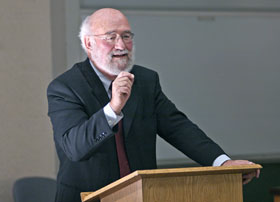For more archives, go to the Advance Archive/Search Page.
Changes In Higher Education
Redefining Faculty Roles
American higher education is undergoing a major transition that is redefining the role of faculty, according to Eugene Rice, a former professor of sociology and religion who until recently was scholar-in-residence and director of the Forum on Faculty Roles and Rewards at the American Association for Higher Education in Washington, D.C.
 |
|
Higher education expert Eugene Rice discusses the changing role of
faculty. |
Rice says societal changes and the new “science of learning” are placing additional demands on faculty members, yet these are not widely recognized in the higher education merit system.
He gave a presentation on “The Changing Role of Faculty” at the Center for Undergraduate Education on Oct. 15 that was sponsored by the Institute for Teaching and Learning and the Teachers for a New Era initiative.
Rice said higher education has undergone a significant upheaval roughly every 50 years, and each of these helped define the current system.
In 1862, a divided nation, struggling with major agricultural and industrial challenges, turned to higher education for answers and established the land-grant colleges, he said. Fifty years later, American higher education turned to Germany for inspiration. The result was a focus on pure research, graduate education, and the development of separate disciplines.
The third major transition came after World War II, which was followed by the launch of Sputnik in 1957 and the start of the Cold War. “It was a period of enormous growth” in higher education, he said, in both access and major funding for research. Another 50 years later, universities are again facing a major transition, generated largely by societal changes.
“There is a new focus on learning,” he said, “There’s a lot of discussion about the knowledge-based society. Society is increasingly learning-based and knowledge-driven.”
These changes are placing new, and often conflicting, demands on faculty members, particularly those in the early stages of their careers.
Among faculty, he said, there is a “changing of the guard.” Now that many senior faculty hired during the period of expansion in the 1960s and 1970s are retiring, large numbers of junior faculty are being hired.
But the career experiences and expectations of younger faculty are different from those of the older generation of faculty members, he said.
Nationally, the majority of full-time appointments in the 1990s were non-tenure track, he said. Citing a recent AAHE national survey of early career faculty, Rice said these faculty are not depending on staying at a single institution for their whole career.
“The walls of the university will become permeable,” he said, with faculty moving from university to community to university. In addition, he said, many Ph.D. graduates will find employment not in academia but in other sectors.
The university will no longer have an exclusive hold on the knowledge base, he said.
Expectations of faculty are changing, Rice said, with growing emphasis on interdisciplinary competency, teaching, professional service, public accountability, student evaluations, and assessment of learning.
In the area of teaching, the emphasis is now on approaches that enable students to learn effectively, rather than just lecturing. “We’re going through a pedagogical revolution that is driven by research on learning,” he said, with a new focus on collaborative learning, active learning, and service learning – all of which place additional demands on faculty.
But when it comes to promotion and tenure, the focus is still on an individual’s specialized knowledge in a particular field and on publications in the national and international arena.
“New faculty are caught between two sets of priorities,” he said.
The role of “complete scholar” is becoming “unbundled,” he said, so that professors increasingly focus on just one aspect of the traditional academic role. In some medical schools, for example, faculty must declare whether they are on a research, teaching, or clinical track, he said, and they will remain on that track for the rest of their career. This is also happening elsewhere in academia, with growing numbers of faculty in non-tenure-track appointments that focus on teaching, as distinct from tenure-track appointments focused on research.
Rice said he prefers an alternative approach: “My vision is for faculty to do all three over a lifetime,” spending different periods of their academic career more heavily involved in research, teaching, or outreach.
In addition, Rice called for a broad definition of scholarship and greater flexibility in the promotion and tenure review process.
Tenure is one of the issues at the heart of the debate between what Rice described as the “collegial culture” and the “managerial culture.”
The collegial culture includes elements such as peer review, a faculty-oriented mechanism of identifying good research; tenure, seen as a passport to the community of scholars; shared governance; and an emphasis on merit.
The managerial culture, on the other hand, which is derived from the corporate sector, uses a different language that emphasizes worth, he said. It focuses on the bottom line, accountability, efficiency, and productivity.
People feel strongly about the differences between the two cultures, Rice said. Legislators and boards of trustees don’t like to hear talk about tenure, while faculty often object to students being described as “customers.”
The university of the future will be caught between these two cultures, he said: “How we manage the two will be significant. We have to honor both sides and come up with a collaborative culture.”

